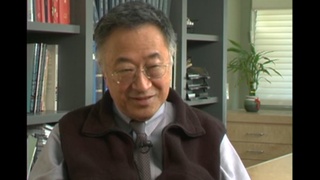Interviews
Dealing with racism within army unit in Korea
There were remarks said to me, and, being an Asian sent to a place like Korea, there was constant, there was a constant sort of reference to, hey, you look like the enemy. And the enemy was called Joe Chink. That's what they called the North Koreans. And frequently they would call me, hey, Joe Chink.
And another thing was like they called me Pop-up, because I looked like the targets that we all shot at. Whenever we did target practice -- 'cause we had to constantly shoot weapons to qualify -- all these pop-ups had slanted eyes and buck teeth. They were from World War II, Japanese stereotype depictions. And I remember the first time I went out there and qualified with a .45, and you can't see these targets, then all of a sudden wham, this figure came up like this and here's this Jap. And you [makes shooting sound] shoot holes in it, boom, another one, another one, another one, five of them come up and they're all Japs. So, that was my nickname, Pop-up.
Date: March 18 & 20, 2003
Location: Washington, US
Interviewer: Alice Ito and Mayumi Tsutakawa
Contributed by: Denshō: The Japanese American Legacy Project.








